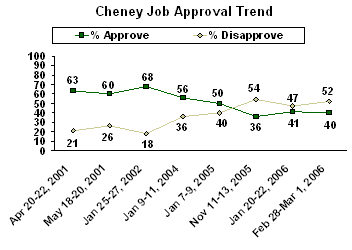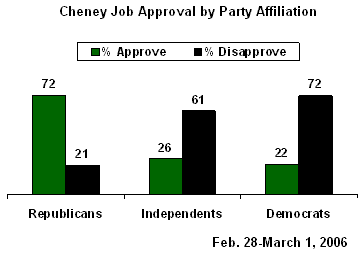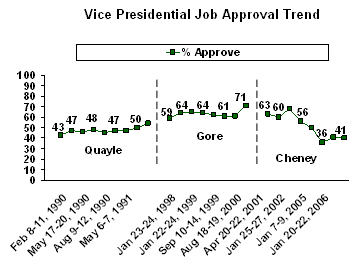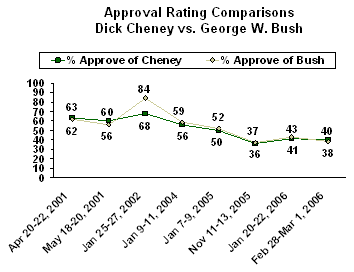GALLUP NEWS SERVICE
PRINCETON, NJ -- The recent hunting accident in which Vice President Dick Cheney shot a fellow hunting companion has had little impact on the vice president's approval ratings, according to a recent CNN/USA Today/Gallup poll. Forty percent of Americans approve of the way Cheney is handling his job, compared with a 41% rating prior to the accident. Cheney's approval rating is now two points higher than President George W. Bush's rating, the first time this has happened since the 9/11 terrorist attacks.
The current 40% approval rating is essentially unchanged since late January (41%), but the percentage of Americans who disapprove of Cheney has increased five points. Despite increased scrutiny of Cheney since the shooting accident, Cheney's rating is actually higher now than it was in November 2005, the low point for both Cheney and Bush.
Cheney's approval ratings were much higher during his first term as vice president, as were Bush's. Cheney received a 63% approval rating in April 2001 and a 60% rating in May 2001. In January 2002, a few months after the 9/11 terrorist attacks, his approval rating reached its highest point, at 68%. By January 2004, it had declined to 56%, then dropping again to 50% by January 2005.

The latest poll also shows a sharp partisan division in Cheney's ratings. Seventy-two percent of Republicans approve of the way Cheney is handling his job as vice president, compared with 26% of independents and 22% of Democrats. Seventy-two percent of Democrats disapprove.

Vice Presidential Job Approval Ratings in Context
Gallup has measured vice presidential approval ratings much less frequently over the years than presidential approval ratings, but the data that do exist for Cheney's immediate two predecessors, Al Gore and Dan Quayle, show that Cheney's ratings are among the lowest. For example, Quayle's lowest approval rating of 43% in 1989 is slightly higher than Cheney's latest three ratings -- 36% in November 2005, 41% this past January, and 40% now. Gore's low point was a 59% rating in March 1997.
On the other end of the spectrum, Cheney's high point of 68% after 9/11 compares favorably with Gore and Quayle. Gore has the highest approval rating that Gallup has measured for a vice president, at 71% following the Democratic National Convention during his presidential bid in 2000.
Cheney's average approval rating as vice president is 52%. This compares with Quayle's 47% average across nine polls from 1989 to 1991, and Gore's 63% average across eight polls from 1997 to 2000.

The following is a more detailed look at the approval ratings for Quayle and Gore:
- Gallup measured ratings of Quayle nine times, beginning in 1989. Across all nine measures, Americans were more positive than negative in their assessment of Quayle, mainly due to the fact that a significant minority had no opinion about Quayle when asked to rate him in any given survey. In 1989, 43% of Americans approved of Quayle. His ratings fluctuated between 44% and 48% in 1990, and then increased to a high of 54% in May 1991, following the end of the Persian Gulf War.
- Gallup started asking Americans to rate Gore beginning in 1997, right after the second term of the Clinton administration began. At that time, 59% of Americans said they approved of Gore. As the Monica Lewinsky scandal heated up in early 1998, ratings of Gore increased, into the low- to mid-60% range. Gore's approval ratings remained at this level until August 2000, when it increased to 71%.
Vice Presidents vs. Presidents
Cheney's job approval ratings are now two points higher than Bush's, marking the first time this has happened since the early days of the administration, in April 2001, with a 63% Cheney approval versus a 62% Bush approval, and again in May 2001, with a 60% to 56% variation.

Overall, the trends in Cheney's approval ratings have closely mirrored the trends in Bush's approval ratings, with the lone exception of the January 2002 survey, when Bush's extraordinarily high rating (84% approval) was 16 points higher than Cheney's. In the other times that Gallup measured Cheney's approval, there have been only a few points difference between Bush and Cheney.
|
Approval Ratings: Dick Cheney vs. George W. Bush |
|||
|
|
|
Difference (Cheney Approval Minus Bush Approval) |
|
|
% |
% |
|
|
|
2006 Feb 28-Mar 1 |
40 |
38 |
+2 |
|
2006 Jan 20-22 |
41 |
43 |
-2 |
|
2005 Nov 11-13 |
36 |
37 |
-1 |
|
2005 Jan 7-9 |
50 |
52 |
-2 |
|
2004 Jan 9-11 |
56 |
59 |
-3 |
|
2002 Jan 25-27 |
68 |
84 |
-16 |
|
2001 May 18-20 |
60 |
56 |
+4 |
|
2001 Apr 20-22 |
63 |
62 |
+1 |
The comparison between the two previous presidents and their vice presidents does not reveal any clear-cut pattern -- Quayle's were consistently and substantially lower than Bush's, and Gore's were higher than Clinton's in most instances.
|
Approval Ratings: Presidents vs. Vice Presidents |
|||
|
|
|
Difference (Vice President Approval Minus President Approval) |
|
|
% |
% |
|
|
|
Al Gore |
|
|
|
|
2000 Aug 18-19 |
71 |
62 |
+9 |
|
2000 Jul 25-26 |
61 |
57 |
+4 |
|
1999 Sep 10-14 |
61 |
60 |
+1 |
|
1999 Mar 12-14 |
62 |
62 |
0 |
|
1999 Jan 22-24 |
64 |
69 |
-5 |
|
1998 Jan 24-25 |
65 |
60 |
+5 |
|
1998 Jan 23-24 |
64 |
58 |
+6 |
|
1997 Mar 24-26 |
59 |
59 |
0 |
|
|
|
|
|
|
Dan Quayle |
|
|
|
|
1991 May 23-26 |
54 |
76 |
-22 |
|
1991 May 6-7 |
50 |
-- |
-- |
|
1990 Nov 8-11 |
47 |
58 |
-11 |
|
1990 Aug 9-12 |
47 |
74 |
-27 |
|
1990 Jul 6-8 |
44 |
63 |
-19 |
|
1990 May 17-20 |
48 |
65 |
-17 |
|
1990 Mar 8-11 |
46 |
68 |
-22 |
|
1990 Feb 8-11 |
47 |
73 |
-26 |
|
1989 Nov 9-12 |
43 |
70 |
-27 |
Survey Methods
Results are based on telephone interviews with 1,020 national adults, aged 18 and older, conducted Feb. 28 to March 1, 2006. For results based on the total sample of national adults, one can say with 95% confidence that the maximum margin of error due to sampling and other random effects is ±3 percentage points. In addition to sampling error, question wording and practical difficulties in conducting surveys can introduce error or bias into the findings of public opinion polls.
Do you approve or disapprove of the way Dick Cheney is handling his job as vice president?
|
Approve |
Disapprove |
No opinion |
|
|
% |
% |
% |
|
|
2006 Feb 28-Mar 1 |
40 |
52 |
9 |
|
2006 Jan 20-22 |
41 |
47 |
12 |
|
2005 Nov 11-13 |
36 |
54 |
10 |
|
2005 Jan 7-9 |
50 |
40 |
10 |
|
2004 Jan 9-11 |
56 |
36 |
8 |
|
2002 Jan 25-27 |
68 |
18 |
14 |
|
2001 May 18-20 |
60 |
26 |
14 |
|
2001 Apr 20-22 |
63 |
21 |
16 |
Do you approve or disapprove of the way Al Gore is handling his job as vice president?
|
Approve |
Disapprove |
No opinion |
|
|
% |
% |
% |
|
|
2000 Aug 18-19 |
71 |
22 |
7 |
|
2000 Jul 25-26 |
61 |
29 |
10 |
|
1999 Sep 10-14 |
61 |
30 |
9 |
|
1999 Mar 12-14 |
62 |
27 |
11 |
|
1999 Jan 22-24 |
64 |
20 |
16 |
|
1998 Jan 24-25 |
65 |
19 |
16 |
|
1998 Jan 23-24 |
64 |
22 |
14 |
|
1997 Mar 24-26 |
59 |
27 |
14 |
Do you approve or disapprove of the way Dan Quayle is handling his job as vice president?
|
Approve |
Disapprove |
No opinion |
|
|
% |
% |
% |
|
|
1991 May 23-26 |
54 |
27 |
19 |
|
1991 May 6-7 |
50 |
25 |
25 |
|
1990 Nov 8-11 |
47 |
33 |
20 |
|
1990 Aug 9-12 |
47 |
23 |
30 |
|
1990 Jul 6-8 |
44 |
30 |
26 |
|
1990 May 17-20 |
48 |
27 |
25 |
|
1990 Mar 8-11 |
46 |
27 |
27 |
|
1990 Feb 8-11 |
47 |
20 |
34 |
|
1989 Nov 9-12 |
43 |
29 |
28 |